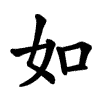Definify.com
Definition 2026
毛
毛
Translingual
| Stroke order | |||
|---|---|---|---|

| |||
Han character
毛 (radical 82 毛+0, 4 strokes, cangjie input 竹手山 (HQU), four-corner 20714)
- Kangxi radical #82, ⽑ (“fur”).
Descendants
References
- KangXi: page 591, character 22
- Dai Kanwa Jiten: character 16772
- Dae Jaweon: page 983, character 26
- Hanyu Da Zidian: volume 3, page 1994, character 1
- Unihan data for U+6BDB
Chinese
|
simp. and trad. |
毛 | |
|---|---|---|
Glyph origin
| Historical forms of the character 毛
| |||
|---|---|---|---|
| Bronze inscriptions | Bamboo and silk script | Large seal script | Small seal script |
 |
 |
 |
 |
| Characters in the same phonetic series (毛) (Zhengzhang, 2003) | |
|---|---|
| Old Chinese | |
| 毛 | *maːw, *maːws |
| 髦 | *maːw |
| 旄 | *maːw, *maːws |
| 芼 | *maːw, *maːws |
| 氂 | *rɯ, *maːw |
| 枆 | *maːw |
| 酕 | *maːw |
| 牦 | *maːw |
| 耄 | *maːws |
| 覒 | *maːws |
| 眊 | *maːws, *mraːwɢ |
| 耗 | *hmaːws |
| 秏 | *hmaːws, *hmɯːbs |
| 毣 | *mraːwɢ, *moːwɢ |
Pictogram (象形) – feather or hair.
Pronunciation
- Mandarin
- Cantonese (Jyutping): mou4
- Hakka (Sixian, PFS): mô
- Min Dong (BUC): mò̤
- Min Nan (POJ): mn̂g / mo͘ / mâu / mô͘
- Wu (Wiktionary): mau (T3)
- Mandarin
- (Standard Chinese, Beijing)+
- Pinyin:
- Zhuyin: ㄇㄠˊ
- Wade-Giles: mao2
- Gwoyeu Romatzyh: mau
- IPA (key): /mɑʊ̯³⁵/
-

- (Standard Chinese, Beijing)+
- Cantonese
- (Standard Cantonese, Guangzhou)+
- Jyutping: mou4
- Yale: mòuh
- Cantonese Pinyin: mou4
- IPA (key): /mou̯²¹/
- (Standard Cantonese, Guangzhou)+
- Hakka
- (Sixian, incl. Miaoli and Meinong)
- Pha̍k-fa-sṳ: mô
- Hakka Romanization System: mo´
- Hagfa Pinyim: mo1
- IPA: /mo²⁴/
- (Sixian, incl. Miaoli and Meinong)
- Min Dong
- (Fuzhou)
- Bàng-uâ-cê: mò̤
- IPA (key): /mo⁵³/
- (Fuzhou)
- Min Nan
- (Hokkien: Quanzhou, Xiamen, mainstream Taiwanese)
- Pe̍h-ōe-jī: mn̂g
- Tâi-lô: mn̂g
- Phofsit Daibuun: mngg
- IPA (Quanzhou): /mŋ̍²⁴/
- IPA (Xiamen): /mŋ̍²⁴/
- IPA (Taipei): /mŋ̍²⁴/
- IPA (Kaohsiung): /mŋ̍²³/
- (Hokkien: Zhangzhou, Yilan, Tainan)
- Pe̍h-ōe-jī: mo͘
- Tâi-lô: moo
- Phofsit Daibuun: mof
- IPA (Zhangzhou): /mɔ⁴⁴/
- (Hokkien: Quanzhou, Xiamen)
- Pe̍h-ōe-jī: mâu
- Tâi-lô: mâu
- Phofsit Daibuun: maau
- IPA (Quanzhou): /maʊ²⁴/
- IPA (Xiamen): /maʊ²⁴/
- (Hokkien: Xiamen, Quanzhou, Zhangzhou, mainstream Taiwanese)
- Pe̍h-ōe-jī: mô͘
- Tâi-lô: môo
- Phofsit Daibuun: moo
- IPA (Xiamen): /mɔ²⁴/
- IPA (Quanzhou): /mɔ²⁴/
- IPA (Zhangzhou): /mɔ¹³/
- IPA (Taipei): /mɔ²⁴/
- IPA (Kaohsiung): /mɔ²³/
- Note: mn̂g, mo͘, mâu - vernacular; mô͘ - literary (including surname).
- (Hokkien: Quanzhou, Xiamen, mainstream Taiwanese)
- Wu
- (Shanghainese)
- Wiktionary: mau (T3)
- IPA (key): /mɔ²³/
- (Shanghainese)
| Rime | ||
|---|---|---|
| Character | 毛 | 毛 |
| Reading # | 1/2 | 2/2 |
| Initial (聲) | 明 (4) | 明 (4) |
| Final (韻) | 豪 (89) | 豪 (89) |
| Tone (調) | Level (Ø) | Departing (H) |
| Openness (開合) | Open | Open |
| Division (等) | I | I |
| Fanqie | 莫袍切 | 莫報切 |
| Reconstructions | ||
| Zhengzhang Shangfang |
/mɑu/ | /mɑuH/ |
| Pan Wuyun |
/mɑu/ | /mɑuH/ |
| Shao Rongfen |
/mɑu/ | /mɑuH/ |
| Edwin Pulleyblank |
/maw/ | /mawH/ |
| Li Rong |
/mɑu/ | /mɑuH/ |
| Wang Li |
/mɑu/ | /mɑuH/ |
| Bernard Karlgren |
/mɑu/ | /mɑuH/ |
| Expected Mandarin Reflex |
máo | mào |
| Baxter-Sagart system 1.1 (2014) | |
|---|---|
| Character | 毛 |
| Reading # | 1/1 |
| Modern Beijing (Pinyin) |
máo |
| Middle Chinese |
‹ maw › |
| Old Chinese |
/*C.mˤaw/ |
| English | hair |
Notes for Old Chinese notations in the Baxter-Sagart system: * Parentheses "()" indicate uncertain presence; | |
| Zhengzhang system (2003) | ||
|---|---|---|
| Character | 毛 | 毛 |
| Reading # | 1/2 | 2/2 |
| No. | 8780 | 8791 |
| Phonetic component |
毛 | 毛 |
| Rime group |
宵 | 宵 |
| Rime subdivision |
1 | 1 |
| Corresponding MC rime |
毛 | 冃 |
| Old Chinese |
/*maːw/ | /*maːws/ |
Definitions
毛
- hair (of humans or animals); fur; feather
- mildew; mold
- (informal) Synonym of 角 (jiǎo, “one tenth of a yuan”).
- coarse; raw; semifinished
- gross; overall
- small; little
- careless; unthinking
- panicked; scared; nervous
- angry; furious
- (of currency) to depreciate; to devalue
- A surname.
- 毛澤東 / 毛泽东 ― Máo Zédōng ― Mao Zedong
Compounds
Derived terms from 毛
|
|
|
Japanese
Kanji
毛
Readings
Etymology 1
| Kanji in this term |
|---|
| 毛 |
|
け Grade: 2 |
| kun'yomi |
Pronunciation
Noun
Etymology 2
| Kanji in this term |
|---|
| 毛 |
|
もう Grade: 2 |
| on'yomi |
From Middle Chinese 毛 (maw).
Pronunciation
Noun
- a kind of unit
References
- 1 2 2006, 大辞林 (Daijirin), Third Edition (in Japanese), Tōkyō: Sanseidō, ISBN 4-385-13905-9
- 1 2 1998, NHK日本語発音アクセント辞典 (NHK Japanese Pronunciation Accent Dictionary) (in Japanese), Tōkyō: NHK, ISBN 978-4-14-011112-3
Korean
Hanja
毛 • (mo)
Eumhun:
- Sound (hangeul): 모 (revised: mo, McCune-Reischauer: mo, Yale: mo)
- Name (hangeul): 털()
- This term needs a translation to English. Please help out and add a translation, then remove the text
{{rfdef}}.